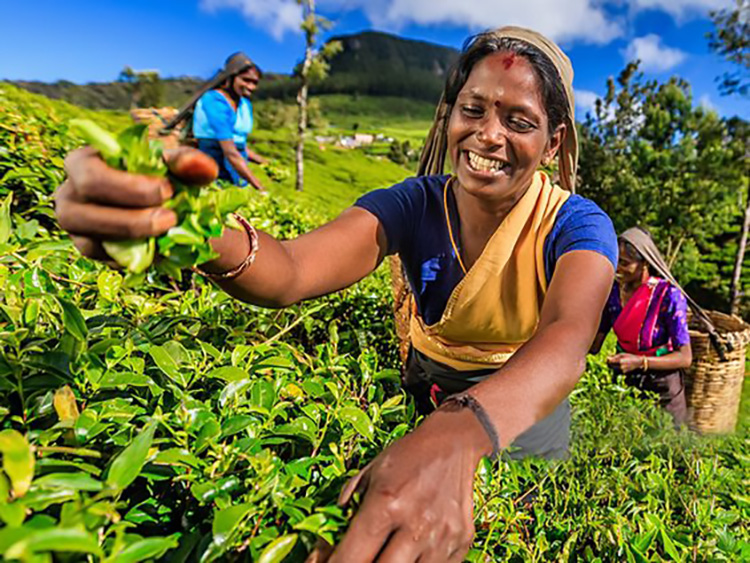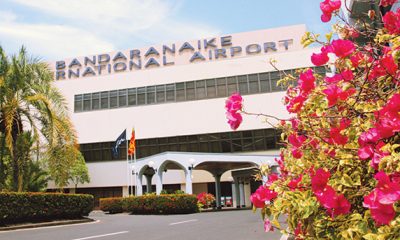Business
Public tug of war on wage hike for plantation sector workers

Planters’ Association says it’s an arbitrary, reckless decision by the government
They reiterate their commitment to a productivity-linked wage model
Warns against any attempt at expropriation by the government
The plantation industry raised its strongest possible objections to the government’s arbitrary, reckless, unilateral decision to drastically hike minimum wages for tea and rubber sector workers by an unprecedented 70%.All producer stakeholders issued a unified warning against the devastating impact the latest increase would have on the plantation sector, leading crippling operational challenges, ultimately leading to severe economic instability for the nation.
“This decision was made without proper consultation or consideration of the needs of all industry stakeholders. In particular, it fails to provide any consideration and threatens to cripple every segment of the Sri Lankan tea and rubber industry. This current effort to force such a clearly unsustainable mandatory minimum wage on tea and rubber smallholders and the Regional Plantation Companies (RPCS) is impossible for the industry to absorb, even with radical cuts to basic operational necessities. The continuity of the entire plantation sector is now at risk, and most critically the livelihoods of the very workers and communities who are connected to the industry across Sri Lanka,” The Planters’ Association of Ceylon stated.
As a result of the decision, the cost of production for tea and rubber is set to rise dramatically, with estimates indicating a minimum 45% increase in the cost per kilogram of tea. This surge in operational costs will render Sri Lanka’s tea and rubber industries uncompetitive in the global market, further exacerbating the financial strain on these sectors.
Additionally, the wage hike will place an enormous burden on Regional Plantation Companies (RPCs), which will face an annual increase in excess of Rs. 35 billion inclusive of EPF/ETF and gratuity payments. This financial strain is unsustainable and threatens the livelihoods of thousands of workers in the plantation sector.
The PA also noted that the current approach of the Government in attempting to coercively set wages for the private sector, and interfere in management of the sector from key Government figures represent a stark violation of the terms of the IMF agreement, which is crucial for Sri Lanka’s economic recovery. This decision is very clearly driven by short-term populist politics aimed at securing electoral victories rather than fostering long-term economic health of the industry, and securing the interests of workers.
The IMF’s $3 billion Extended Fund Facility (EFF) for Sri Lanka is contingent on several stringent conditions aimed at ensuring fiscal consolidation including reduced intervention in state-owned enterprises (SOE). Historically, state control over enterprises has led to inefficiencies and financial burdens, as evidenced by the failures of numerous state-run businesses in Sri Lanka.
Historically, the state has consistently failed to manage State-Owned Enterprises (SOEs) effectively, leading to steep losses and in many instances, near total collapse. By the time of privatization in 1992, state owned plantations made continuous losses that had to be heavily subsidized by the Government up to Rs. 5 billion per year which was borne by the Treasury.
A further Rs. 8 billion was owed by the JEDB and SLSPC to the Bank of Ceylon and Peoples’ Bank as a result of a US$ 300 million lending facility which was extended to the state plantations by the World Bank. While these funds were intended for the improvement of the plantations industry, there were no significant improvements and the plantations did not have the ability to repay the debts, and the Government was eventually compelled to absorb this debt.
Following privatization, worker wages appreciated sharply, and with a significantly larger workforce of 327,123 within the RPC sector the industry was able to operate more effectively, investing substantially towards the development of the industry, including all of the key certifications and standards that have allowed Pure Ceylon Tea, and rubber to maintain a reputation for unmatched quality relative to global competitors.
These efforts have led to improvements in efficiency and productivity, which are now at risk due to the proposed wage hike. It is also important to note that all these companies are publicly traded companies listed on the Colombo Stock Exchange. Any attempt at a second and immediate expropriation by the Government will therefore contravene Securities and Exchange Commission and SEC rules, the Companies Act and other related statutory provisions.
Such an arbitrary and impractical decision also risks severe damage to local and foreign investor confidence alike. The PA warned that this would have negative consequences beyond the plantation industry, especially at a time when Sri Lanka desperately requires foreign direct investment to help boost strategically important sectors in manufacturing and services, as well as the agriculture sector.
The PA has long advocated for a shift to a productivity-linked wage model or a revenue share model, which aligns worker compensation with productivity and revenue earned at auction. This approach not only incentivizes productivity but also ensures a fair and sustainable wage system for workers. Already workers under revenue share under the previous wage structure recorded earnings in excess of the minimum wage that was recently gazette.
The current daily attendance-based minimum wage model is outdated and does not reflect the realities of the modern plantation industry. Any disruption to production or quality standards could send shockwaves through export markets, diminishing export revenues and competitiveness.
“We urge policymakers to prioritize long-term economic stability over short-sighted decisions and to consider the industry’s proposals for a productivity-linked wage model,” the PA said.
Business
AHK Sri Lanka champions first-ever Sri Lankan delegation at Drupa 2024

The Delegation of German Industry and Commerce in Sri Lanka (AHK Sri Lanka) proudly facilitated the first-ever Sri Lankan delegation’s participation at Drupa 2024, the world’s largest trade fair for the printing industry and technology. Held after an eight-year hiatus, Drupa 2024 was a landmark event, marking significant advancements and opportunities in the global printing industry.
AHK Sri Lanka played a pivotal role in organising and supporting the delegation, which comprised 17 members from the Sri Lanka Association for Printers (SLAP), representing eight companies from the commercial, newspaper, stationery printing, and packaging industries. This pioneering effort by AHK Sri Lanka not only showcased the diverse capabilities of Sri Lanka’s printing sector but also facilitated vital bilateral discussions with key stakeholders from the German printing industry.
Business
Unveiling Ayugiri: Browns Hotels & Resorts sets the stage for a new era in luxury Ayurveda Wellness

In a captivating reimagining of luxury wellness tourism, Browns Hotels & Resorts proudly unveiled the exquisite Ayugiri Ayurveda Wellness Resort Sigiriya. This momentous occasion, celebrated amidst a vibrant and serene grand opening on the 6th of June, heralds a new chapter in the Ayurveda wellness tourism landscape in Sri Lanka. Nestled amidst 54 acres of unspoiled natural splendour, Ayugiri features 22 exclusive suites and stands out as the only luxury Ayurveda wellness resort in the country offering plunge pools in every room, rendering it truly one-of-a-kind.
The grand opening of Ayugiri Ayurveda Wellness Resort was an enchanting event, where guests were captivated by the melodies of flutists and violinists resonating through Sigiriya’s lush landscapes. As traditional drummers and dancers infused the air with vibrant energy, Browns Hotels & Resorts’ CEO, Eksath Wijeratne, Kotaro Katsuki, Acting Ambassador for the Embassy of Japan and General Manager, Buwaneka Bandara, unveiled the resort’s new logo, marking a significant moment witnessed by distinguished guests from the French Embassy, Ayurveda and wellness enthusiasts along with officials from the Sigiriya area, LOLC Holdings and Browns Group.
“Our strategic expansion into wellness tourism with Ayugiri Ayurveda Wellness Resort Sigiriya symbolises a significant milestone for Browns Hotels & Resorts. Wellness tourism has consistently outperformed the overall tourism industry for over a decade, reflecting a growing global interest in travel that goes beyond leisure to offer rejuvenation and holistic well-being. By integrating the timeless wisdom of Ayurveda with modern luxury, we aim to set a new standard in luxury wellness tourism in Sri Lanka. Whether your goal is prevention, healing, or a deeper connection to inner harmony, Ayugiri offers a sanctuary for holistic well-being” stated Eksath Wijeratne.
Ayugiri encapsulates the essence of life, inspired by the lotus flower held by the graceful queens of the infamous Sigiriya frescoes. Just as the lotus emerges from the murky depths, untainted and serene,
Ayugiri invites guests on a journey of purity and rejuvenation, harmonised with a balance of mind, body and spirit, the essence of nature, echoes of culture and the wisdom of ancient Ayurvedic healing.
Business
HNB General Insurance recognized as Best General Bancassurance Provider in Sri Lanka 2024

HNB General Insurance, one of Sri Lanka’s leading general insurance providers, has been honored as the Best General Bancassurance Provider in Sri Lanka 2024 by the prestigious Global Banking and Finance Review – UK.
The esteemed accolade underscores HNB General Insurance’s unwavering commitment to excellence and its outstanding performance in the field of bancassurance. Through dedication and hard work, the HNB General Insurance team has continuously endeavored to deliver innovative insurance solutions, cultivate strong relationships with banking partners, and provide unparalleled service to customers nationwide. This recognition is a testament to the team’s dedication and relentless pursuit of excellence in the bancassurance business.
“We are honored to receive this prestigious award, which reflects our team’s tireless efforts and dedication to delivering value-added insurance solutions and exceptional service through our bancassurance partnerships,” said Sithumina Jayasundara, CEO of HNB General Insurance. “This recognition reaffirms our position as a trusted insurance provider in Sri Lanka and motivates us to continue striving for excellence in serving our customers and communities.”
























